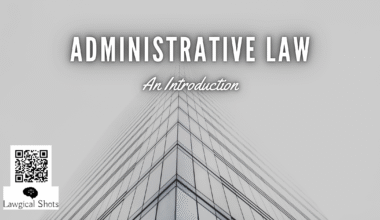The sole purpose of the law and the legal system is to ensure order, fairness and justice. These laws originate from many sources, one of them being the Legal Maxims, which mainly comprise Latin phrases, acting as guidelines for legal interpretations and rulings. They may not be legally binding, but are often incorporated by lawmakers into the legislation and have a significant impact on legal reasoning. One such legal maxim, which is usually cited as the fundamental basis of the Principle of Natural Justice, is “Nemo Judex in Causa Sua”. As a hint, it is one of the basic principles of natural justice. Let’s dive deeper to explore its meaning, examples and case laws.
Nemo Judex in Causa Sua Meaning
“Nemo Judex in Causa Sua”, literally interpreted as “no one should be a judge in their case”, i.e one cannot be a judge or authority to pass a judgement in their own case. It focuses on impartiality and the prevention of bias or conflict of interest by disqualifying a decision maker who may have a personal interest in the case. It re-establishes that the law is equal for all and ensures that justice is not only done but also seen to be done.
Tracing its heritage, the Byzantine Empire established the Roman Law, which gave the Body of Civil Law, Corpus Juris Civilis, encapsulating impartiality by adapting the principle that no individual should preside over their case. Later, legal jurists like Edward Coke (17th century) formalised the Latin phrase that has made solid grounds in Constitutionalism and the common law. Nemo Judex in Causa Sua safeguards fairness by ensuring that the decisions are made through merit and not through personal interests. The Legal Maxim helps the judiciary establish and maintain trust among the public by preventing even the appearance of bias.
Essential Elements of Nemo Judex in Causa Sua
The application of this doctrine varies in each case, where the Court takes its interpretation in different forms for different scenarios. But in the application or interpretation, the law focuses on a few essential elements that summarise the crux of this maxim. Such fundamental elements can trigger its high applicability:
● The person in authority or adjudicating must have personal, pecuniary, or official bias or interest in the case. This creates a presumption of bias.
● Perceived partiality, i.e., even when bias is absent, the perception of interest is enough to invoke this doctrine.
● The person in question must be an authority in charge or a judge in the said case. If the person involved does have the authority to adjudicate or has influence over the decision, then the doctrine is applied.
This doctrine is inapplicable in cases where the person in charge has no bias, interest or influence over the case and there is mere speculation of the possibility of bias. The legal maxim creates grounds to establish and maintain proper procedural safeguards and transparent recusal to eliminate any reasonable apprehension of bias. The different forms of bias that an adjudicating authority can be accused of are given as follows:
- Personal Bias: A Personal or professional relationship between the authority and the party in dispute establishes the grounds of personal bias.
- Pecuniary Bias: When an adjudicating authority has a direct financial interest in the outcome of the dispute, the grounds of pecuniary bias are proven.
- Subject-matter Bias: Subject-matter bias refers to the adjudicating authority’s prejudice towards a specific problem. It has to do with the judge’s demeanour and behaviour.
Nemo Judex in Causa Sua Examples
● When a school student is accused of misconduct and is facing disciplinary action. But, the head of the disciplinary committee is his father, who is also the principal of the school – This creates a personal bias in favour of the student, which mandates the authority to recuse themselves.
● A company is a party in a case before a judge who happens to own shares of that company. This proves the grounds of pecuniary bias or financial interest, which implies that the authority in question must not adjudicate the case.
● In a department where a senior officer worked and made important decisions, the senior officer himself is asked to head an investigation into claims of corruption. The officer would be judging his past actions in this official bias when a neutral person should be leading the probe. ● A member accuses the club president of embezzlement. The internal committee that considers the complaint is chaired by the president himself. Here is an apparent conflict of interest, which clarifies why one cannot be a judge in their own case.
Case Laws on Nemo Judex in Causa Sua
● In A.K. Kraipak v. Union of India (1969), the acting Chief Conservator of Forests was a member of the Selection Committee for the All India Services of the Forest Department. He was also one of the candidates who applied for the All India Services of the Forest Department. Although it was asserted that he hadn’t taken part in any deliberations during the selection process, the Court held that there was a conflict between his interest & the duty being cast on him. There was a real likelihood that the bias for the mere presence of the candidate on the Selection Board may adversely influence the judgment of other members.
● In Gullapalli Nageswara Rao and Others v. Andhra Pradesh State Road Transport Corporation (1958), the Supreme Court quashed the Andhra Pradesh government’s decision to nationalise road transport. They annulled it on the ground that the secretary of the transport department, who gave the hearing, was interested in the subject matter of the dispute. Hence, this amounted to a violation of the principle of natural justice nemo judex in causa sua.
● In another case of Mineral Development Ltd. v. The State of Bihar (1959), the Government granted the petitioners a mining lease in 1947. But the same was quashed in 1955 by the Government. The petitioners alleged that the quashing order suffered from personal bias as the minister who passed the order had a political rivalry. The Supreme Court found the allegations true and quashed the said order.
Conclusion
Nemo Judex in Causa Sua ensures that fairness and impartiality remain indispensable at every judicial and legal proceeding. The legal maxim is justly called as the vital pillar of the Principle of Natural Justice. It eliminates any potential or perceived bias along with actual bias, thereby reinforcing the public’s confidence in the justice system. Besides this, the process should be transparent to ensure that all parties understand the process and the reasons behind the decision. The decision-makers should be independent and impartial to ensure that the decisions are made without bias or influence.
This doctrine protects the integrity of the justice system by preventing those with competing interests from taking part in decision-making. As courts have emphasised time and time again, justice must not only be done, but it must also be seen as having been done. In a generation where transparency and accountability are paramount, Nemo Judex in Causa Sua upholds Natural Justice and the rule of law by protecting the right to fairness and equality in trial.
The legal maxim nemo judex in causa sua has been simplified by our intern, Ms Trinetra Thobde. She has been assisting the team in bringing informational legal blogs.








